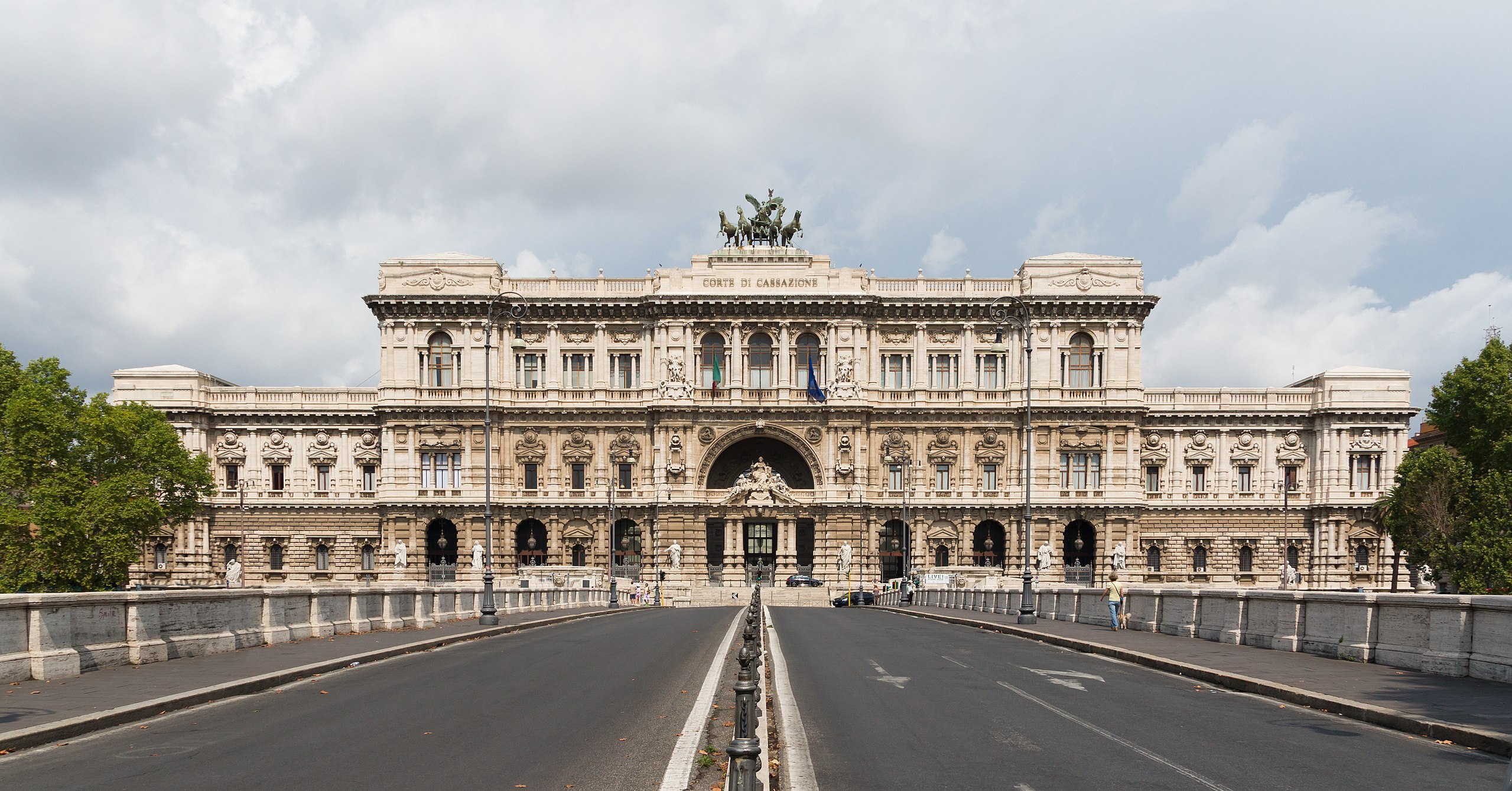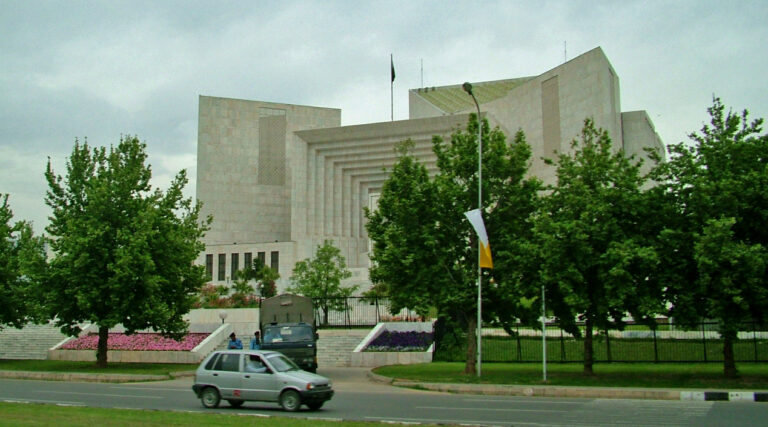
Right-Wing Populism and Religion – The Case of Brothers of Italy
Luca Ozzano
Corte Suprema di Cassazione in Rome, Italy from Wikimedia Commons (CC0 1.0)
This article is part of our series on Transnational Christian Nationalism, and its impact on politics, the rule of law, and religious freedom. If you’d like to explore other articles in this series, click here.
Since the 1990s, but more significantly since the 2010s, Europe and other parts of the world have witnessed a new wave of right-wing political parties, labelled as a new radical right, or more commonly as “right-wing populist parties”. Considering that these parties, with very few exceptions, adopt religion as a relevant plank of their platforms, both because of their morally conservative positions and because of their opposition against religious minorities (particularly, in most cases, Islam), the discussion on the role of the sacred in the ideology of this new right has also come to the fore. This paper will try to contribute to the literature on the nexus between religion, right-wing populism and cleavages by focusing on the case study of Brothers of Italy which is led by the current Italian Prime Minister, Giorgia Meloni. This essay argues that, after moving from the opposition to the government, this party’s stances, by most of all its rhetorical tones on sensitive issues, have somewhat moderated, possibly signalling a shift toward the centre.
Italy has been a laboratory for populism since the 1990s, with the rise of Silvio Berlusconi’s Go Italy (Forza Italia, hereby FI), and the Northern League (Lega Nord, hereby LN); and, in the 2000s and 2010s, with the success of an allegedly non-partisan populist party, the Five Star Movement (Movimento Cinquestelle, hereby M5S). It is however since the late 2010s that the role of populism has become a source of concern for many, with the overwhelming success of two different right-wing populist parties: first Matteo Salvini’s League (Lega), and more recently Giorgia Meloni’s Brothers of Italy, which in 2022 won the elections with 26% of the votes.
This essay will focus on the Brothers of Italy (Fratelli d’Italia, hereafter FdI) and the role of religion in its positioning on sensitive moral issues, including on gender, sexuality, religious pluralism and multiculturalism. As the literature shows, right-wing populist parties’ use of religion is quite peculiar, focusing on the ‘belonging’ rather than the ‘believing’ and ‘behaving’ dimensions in an exclusionary manner towards other communities (particularly migrants and Muslims). After investigating the historical roots of FdI, I will show that in its early years, it proposed fully-fledged identity-driven and civilizational stances, not rarely with clear religious tones. However, after winning the elections and leading the government, its rhetoric has significantly softened. Is this a move towards the centre (or at least a less identity-driven approach) or just a tactical move aiming at capturing moderate voters?
Brothers of Italy’s Background
Meloni’s party was formally created in 2012 as an offshoot of the main centre-right party People of Freedom (Popolo delle Libertà, hereby PdL). However, its roots have to be found in the post-Fascist political field, mainly represented throughout the second half of the 20th century by the Italian Social Movement party (Movimento Sociale Italiano, hereby MSI). The MSI started a process of moderation and mainstreamization in the early 1990s, changing its name into AN (whose students’ organization was, since 1996, led by Meloni). Its new leader Gianfranco Fini explicitly renounced the fascist experience (which he even defined as “absolute evil”, raising significant controversies among the militants of the party) and paved the way for an alliance with the tycoon Silvio Berlusconi and his FI party. This history is integral to the FdI’s current composition. Indeed, in 2023, 22 of the 24 members of the Executive Committee of FdI had already been involved in AN, and 16 of them had previously been members of the MSI (including first-tier representatives of the party, such as Adolfo Urso and Ignazio La Russa).
Founded by former supporters of the Fascist regime, the MSI never concealed its nostalgia for its historical political experience. Quite interestingly, however, there were disagreements within the party about how to interpret such experience: between the supporters of the idea of the “Fascist regime” and others the “Fascist movement”. While the former were nostalgic for the institutionalized Fascist regime, with its conservative or even reactionary positions in economic, social, and cultural terms, the latter were instead inspired by the early stages of the Fascist movement, with its anti-bourgeois, anti-capitalist, and anti-clerical orientation. This was also true at the international level: although the dominant factions managed to impose a stance timidly supporting Italy’s inclusion in the NATO, they had to face a lively opposition from the minority representatives, who still supported the Fascist idea of a third way between capitalist America and communist Russia in both economic and foreign policy fields.
This ambivalence was palpable in relation to religion and morality politics. The official MSI’s stances on such issues was mainly inspired by conservative or even ultra-conservative positions (especially in Rome, where the party was strictly tied to the far-right wing of the Catholic Church): for example, in the 1970s the party resolutely opposed the legalization of both divorce and abortion. However, more secularist and even, at times, anti-clerical positions occasionally came to the fore among its militants. Indeed, according to Piero Ignazi, the anti-capitalist, anti-establishment and even pro-third world positions of the ‘movement’ wing of the party proved particularly attractive for some Italian youth. This dynamic became salient in the 1970s, when the young right-wing militants (and their organizations, particularly the Youth Front) developed their own counterculture, actualized in events such as the ‘Hobbit camps’ which took place between 1977 and 1981. In the late 1990s, Meloni, as the leader of the youth branch of AN, renewed this experience through a far-right festival named Atreju (another name referring to fantasy literature), which has been running since 1998 and now hosts international guests like Elon Musk, the Albanian Prime Minister Edi Rama and the leader of the Spanish VOX party, Santiago Abascal.
The AN experimented with a number of positions on religion- and morality-related debates from the 2000s to the early 2010s, when it allied with the pro-free trade FI and the identity-driven LN and clearly showed a dynamic of oscillation. In some cases, especially when national identity was at stake – for example during the debates about the inclusion of a reference to the Christian roots in the preamble to the draft EU constitution, and about the presence of crucifixes in Italy’s public schools – the party and its leader seemed more concerned about identity issues; in others, in relation to some bioethics issues such as assisted procreation, but also to immigration (with Fini proposing to give the right to vote in local elections to legal immigrants, and to include the optional teaching of Islam in public schools’ curricula) they seemed to propose instead a very different idea of French-style secular ‘republican’, or even multicultural citizenship.
A turning point for the history of the Italian post-fascist right came in 2009, when Berlusconi managed to get AN to merge with FdI to create a new centre-right umbrella party, the PdL. Fini became increasingly impatient under Berlusconi’s charismatic rule, and in 2010 he decided to leave the PdL to create a new party with a more centrist and secular identity, Future and Freedom for Italy (Futuro e Libertà per l’Italia) and, subsequently, left active politics. In this context, Meloni chose instead to part ways with her former mentor, stayed in the PdL, and quietly carved her niche in the Italian right-wing field. It was only at the end of 2012 that she decided in turn to move away from a discredited Berlusconi to create her own party, FdI.
Brothers of Italy’s Stances
In the following years, which were marked by a breakthrough of right-wing populist parties in most of Europe, FdI put forward stances and policy proposals marked by a strong identity-driven orientation. In the domestic realm, FdI and Meloni’s rhetoric and policy proposals were very tough on issues related to bioethics, gender and immigration; in the European context, the party entered the Conservatives and Reformists group, and Meloni developed close relations with other right-wing leaders and movements. For example, during the 2022 campaign, she chose to participate in an event organized by the Spanish Vox party, where she delivered a very inflamed speech:
Yes to the natural family, no to the LGBT lobby. Yes to sexual identity, no to the gender ideology. Yes to the culture of life, no to the abyss of death. Yes to the universality of the cross, no to the Islamist violence. Yes to safe frontiers, no to massive immigration. Yes to jobs for our citizens, no to the big international finance. Yes to peoples’ sovereignty, no to Brussels’s bureaucracy. And yes to our civilization and no to those who want to destroy it.
These few words are one of the most effective syntheses of the identity-driven, community-focused, civilizational and religiously inspired populist right ever pronounced, and it is not surprising that they sparked a significant debate in the Italian public sphere. These positions were particularly relevant considering that FdI, after faring on single digits for some years, had suddenly benefited from its opposition to the government led by the technocrat Mario Draghi, and the problems experienced by Salvini. As a consequence, Meloni’s party had soared in the polls as the only significant alternative to the League, which, as mentioned, led FdI to win the elections in the fall (as part of a coalition also including the League itself, and Berlusconi’s FI). The elections were indeed marked by a breakthrough of FdI, with 26% of the votes (while the League resized to 8.8%). Consequently, FdI’s leader Giorgia Meloni became the new Italian Prime Minister– an event hailed with enthusiasm by some, considering that Meloni is the first female Prime Minister in Italian history; but with concern by others, considering the post-fascist background of her party.
After Meloni’s sweeping victory in the 2022 Italian parliamentary elections, we can however see a partial change in the positioning and especially the rhetorical style of the new Italian Prime Minister. In her social media posts, and other public statements, she seems indeed mostly to refrain from inflamed tones, and sometimes avoids the most controversial issues, especially in terms of morality and identity politics. The idea seems to be a re-positioning of the party and Meloni as a reliable leadership, in front of the Italian public opinion, but most of all, at the international level. In terms of policies, this new attitude has also emerged with particular clarity in relation to Russia’s invasion of Ukraine. While in the past FdI, as well as the the Lega, had flirted with pro-Russian positions (Meloni was known, for example, for her particularly close relation with Hungarian Prime Minister Orban), after the start of the military crisis, the Italian government has stood out for its pro-Ukrainian and pro-NATO stance.
In the domestic policies domain, although without openly changing her previous positions, Meloni has mostly refrained from being engaged on major morality policy controversies. The only controversial piece of legislation endorsed by the new government is a draft bill which would make surrogate motherhood a crime, even if the procedure is carried out in other countries, where this practice is permitted. Although this law proposal was the source of significant controversies in the Italian public debate, it can hardly be labelled as revolutionary, considering that the opposition against surrogacy is largely endorsed not only by Italian conservatives, but also by many centrist and even progressive Catholics, as well as some feminist groups; and that the procedure is already forbidden in Italy.
Despite some occasional ‘incidents’ (such as Minister Lollobrigida’s infamous statement on immigration allegedly leading to ‘ethnic replacement’), we can find a very similar attitude in the field of religious pluralism and multiculturalism, where the only significant new law proposal put forward by the new government – and currently under discussion – would prohibit the creation of mosques in buildings originally designed for industrial or commercial use. While this law, if approved, would make it more difficult for Muslims in Italy to exercise their right to worship, it would be more an aggravation of an already existing situation of discrimination (the Italian Muslim community is the only significant religious minority without a formal agreement – Intesa – with the Italian state) rather than a radical change from the past policies of centre-right governments, which posed serious problems in terms of religious freedom.
Concluding Remarks
To sum up, the early FdI’s positioning seemed largely modelled after a ‘typical’ right-wing populist positioning, with conservative stances on both moral issues and religious pluralism, coupled with anti-globalist, exclusionary nationalist and pro-religious stances. After their rise to power, the FdI party and Giorgia Meloni seem, however, to have undertaken a more unclear path. While none of the previous positions has significantly changed (with the exception of the international positioning of the party, now staunchly pro-NATO), Meloni seems to be quite cautious in her public statements, probably in order to convey the image of a reliable stateswoman, both towards the Italian conservative public opinion and the international partners. In her social media posts, she has mostly refrained – unlike what was done, for example, by the Lega’s leader Matteo Salvini during his years as Minister of the Interior – from heated tones and from insisting on the most controversial issues, especially in the field of morality politics. Despite some ‘incidents’, such as Minister Lollobrigida’s infamous statement on ‘ethnic replacement’, this apparently shows the desire to take some distance from a strong activism on the ‘identity’ cleavage to adopt more ‘traditionally’ conservative positions, with a moderately nationalist and pro-religious orientation. If this is just an example of ‘tactical moderation’, or the actual long-term strategy of the party and its leader to set themselves and the new Christian Democracy up by occupying the moderate centre-right of the political spectrum, then only time will tell. ♦

Luca Ozzano is Associate Professor of Political Science at the University of Turin, in Italy. His more recent publication is The Masks of the Political God. Religion and Political Parties in Contemporary Democracies (Rowman and Littlefield 2020).
Recommended Citation
Ozzano, Luca. “Right-Wing Populism and Religion: The Case of Brothers of Italy.” Canopy Forum, October 11, 2024. https://canopyforum.org/2024/10/11/right-wing-populism-and-religion-the-case-of-brothers-of-italy/.
Recent Posts










